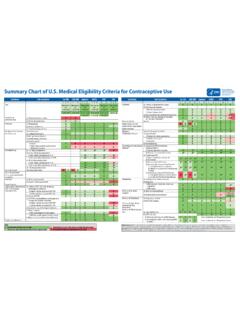Transcription of Developmental Stages and Grief: Children and Teens
1 _____ Kara means to grieve with, to care. 457 Kingsley Avenue Palo Alto CA 94301 (650) 321-5272 Page 1 of 7 Developmental Stages and Grief: Children and Teens Psychosocial Development (Erikson) Cognitive Development (Piaget) Developmental Stage Infancy: Birth to 18 months Sensorimotor: Birth to 2 years Primary Developmental Challenge Basic trust vs. Mistrust To construct an understanding of the world by coordinating sensory experiences with physical, motoric actions. Ability Being Developed Ego Virtue = Hope Progression from reflexive, instinctual action (at birth) to the beginnings of symbolic thought (at the end of the stage). Child s Beliefs About Death: No concept of death; Limited concept of time; Closest relationship to death in sleep / awake transition and games such as peek-a-boo.
2 Grief Reactions: General distress, shock, despair, protest, sleeplessness; May show increased primary needs for touching, holding; May show increased reluctance to be separated from nurturer. Ways Adults Can Help: Offer abundant love, consistently available nurturance and reassurance, and ensure that routines are maintained and the environment is secure; Meet increased attachment needs for eye contact, facial expressions, touching, rocking, and singing. Psychosocial Development (Erikson) Cognitive Development (Piaget) Developmental Stage Toddlerhood: Infancy to 3 years Pre-operational (symbolic function): 2 to 4 years Primary Developmental Challenge Autonomy vs. Shame / Doubt Egocentrism, Animism Ability Being Developed Ego-Virtues = Will & Self-control Construction of mental concepts and representations of objects that are not present, via images, words and drawings.
3 _____ Kara means to grieve with, to care. 457 Kingsley Avenue Palo Alto CA 94301 (650) 321-5272 Page 2 of 7 Child s Beliefs About Death: Death seen as reversible, impermanent; Death regarded as temporary separation; Repeated explanations do not increase child s understanding, because cognitive ability to understand death is limited; Confusion of fantasy vs. reality; On an unconscious and non-verbal level, may assume what happens is under their control and is therefore their fault. Grief Reactions: Confusion, agitation at night, nightmares; Repeated questions are common; May relieve anxiety through fantasy or acting out behaviors; May feel guilty or at fault; May fear being left alone; May regress to earlier Stages , needs; May not understand the sadness around him or may seem unaffected.
4 Ways Adults Can Help: Reassure child he will be cared for, and assure him that he did not cause it to happen & IT IS NOT HIS FAULT; Give direct information ( , simple, honest words, concrete explanations, repetition, and patience) to help counter-balance the blur between fantasy / reality; Accept regressive behavior; Help child acknowledge own feelings anger, sadness, fear, etc.; Offer the opportunity for inclusion in family rituals such as the funeral, but provide a supportive adult at the event to ensure that the child s wishes are honored should he change his mind or want to leave. Psychosocial Development (Erikson) Cognitive Development (Piaget) Developmental Stage Early Childhood: 3 to 6 years Pre-operational (Intuitive Thought): 4-7 years Primary Developmental Challenge Initiative vs.
5 Guilt Centration vs. Conservation, Intuitive vs. Logical Reasoning Ability Being Developed Ego-Virtues = Purpose & Direction An emerging interest in the use of primitive reasoning to know why things are the way they are. Child s Beliefs About Death: Beginning to see death as final, universal, but only for others (not for me); Experience over time with the concrete reality of the deceased not reappearing begins to have meaning, but the cognitive ability to understand death is still limited; Death often perceived as external a person, spirit; May believe he can escape death by being good or trying hard; Neither believes nor denies that he will die. Grief Reactions: May regress to an earlier stage and act younger; May cling to an adult caregiver, show anxiety that the adult may die or become ill; May tell everyone and anyone about the death - questions about the death or the deceased are common; In general, Children cycle through their emotions much more rapidly than adults smiling one minute, crying the next, angry the next, and giggling a minute later; Emotions may seem amplified at times ( , frustrations that would have been minor before the loss may result in major meltdowns that last _____ Kara means to grieve with, to care.)
6 457 Kingsley Avenue Palo Alto CA 94301 (650) 321-5272 Page 3 of 7 longer than expected), but at other times the child may say, I m happy, or may seem unaffected. Ways Adults Can Help: Same as above for the toddler, plus increased dialog about the deceased and opportunities for the child to participate in ways to remember them; Give the child age-appropriate, brief information and then attune to his questions and curiosities, answering him honestly and providing frequent opportunities to talk briefly; Continue to tell stories about the deceased, show pictures of them, and help the child understand their relationship with them. Psychosocial Development (Erikson) Cognitive Development (Piaget) Developmental Stage Middle Childhood: 6 to 12 years Concrete Operational: 7 to 11 years Primary Developmental Challenge Industry vs.
7 Inferiority Problem-solving limited to actual (concrete) objects or events, and not abstract concepts or hypothetical tasks. Ability Being Developed Ego-Virtue = Competency The elimination of egocentrism, coupled with the emergence of logical reasoning as evidenced by the following processes: Seriation, Transitivity, Classification, Decentering, and Conservation. Child s Beliefs About Death: Perceives the irreversibility, permanence, inevitability of death, and perceives his own mortality; Child has vivid ideas about what occurs after death, and may be concerned with the consequences following death. Grief Reactions: Coping may take the form of gathering lots of information and/or becoming an expert in the disease that caused a death; May act like nothing happened or deny that things are different; Tend to show grief through play or behaviors instead of talking about it; May exhibit a combination of numbness, shock, sorrow, confusion, fears, anxiety, anger, embarrassment, happiness and humor in short cycles; May desire to conform to peers and present a fa ade of coping; Peer relationships are becoming increasingly important however, whereas some Children elicit support from their friends, others try to hide the fact that they ve experienced a death.
8 Ways Adults Can Help: Respect the child s need to know, with an awareness that choices, inclusion, and information give the child some form of control; Provide simple, honest answers and information; Give ample reassurance about the future and clarity that they are not responsible for it nor for the death; Physical outlets, play, expressive art, reading, and memory _____ Kara means to grieve with, to care. 457 Kingsley Avenue Palo Alto CA 94301 (650) 321-5272 Page 4 of 7 books can be helpful; Do not require Children to be brave, grown-up, in-control, or to comfort others; Support the child s unique style of coping, allowing him to express or withhold feelings as needed; Be firm, but kind, in upholding limits and rules. Psychosocial Development (Erikson) Cognitive Development (Piaget) Developmental Stage Adolescence: Puberty to 19 years Formal Operational: 11 years to Adulthood Primary Developmental Challenge Identity vs.
9 Role Confusion Adolescent Ego-Centrism: Imaginary audience, Personal Fable, Invincibility Ability Being Developed Ego-Virtue = Individuation The application of abstract reasoning and logical-deductive problem solving to hypothetical situations as well as concrete experiences. Child s Beliefs About Death: Attitudes towards death becoming similar to adults; Fully recognize their own mortality, but may act as though it could never happen to them. Grief Reactions: Physical: May feel fatigued, sleep more/less, gain/lose weight, have headaches, get ill more easily, be accident -prone, restless, may be attracted to alcohol, smoking, drugs, excessive risk-taking. Mental: May experience trouble concentrating in school, forgetfulness, lack of motivation, negative attitude, no one understands; May need to ask, why?
10 Or say if only, mourning what might have been. Emotional: Lonely, hopeless, mood swings, sad, irritable, worried, angry, anxious, fearful, relieved, guilty, joyless, crying spells, frustration, revenge; Monitor for signs / symptoms of depression. Spiritual: May experience loss of direction, purpose, meaning, faith. Relational: May feel isolated, less cooperative, withdrawing from or lashing out at others; May fill emptiness with intimacy, sex; Friendships may change a lot as the teen wants others to reach out more or leave him alone; May have difficulty with others reactions and what is said about the death, as well as with the everyday content of peers conversations, which may suddenly seem trivial compared to the death; Can be left feeling isolated in a crowd.



